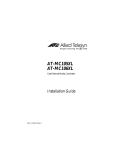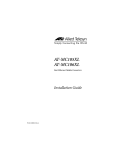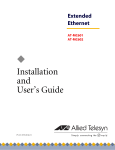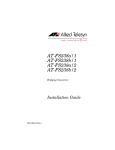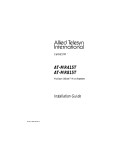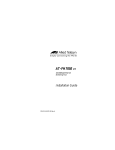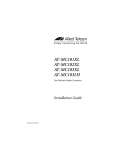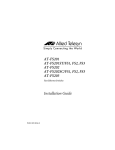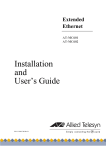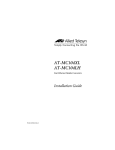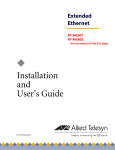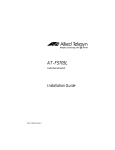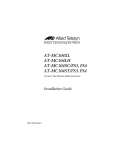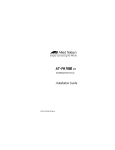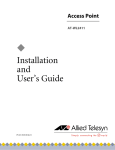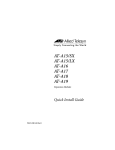Download Allied Telesis AT-MC13 Installation guide
Transcript
AT-MC13 AT-MC14 Ethernet Media Converters Installation Guide PN 613-50291-00 Rev A Copyright 2002 Allied Telesyn, Inc. 960 Stewart Drive Suite B, Sunnyvale CA 94086 USA All rights reserved. No part of this publication may be reproduced without prior written permission fro Allied Telesyn, Inc. e Ethernet is a registered trademark of Xerox Corporation. All other product names, company names, logos or other designations mentioned herein are trademarks or registered trademarks of their respective owners. Allied Telesyn, Inc. reserves the right to make changes in specifications and other information contained in this document without prior written notice. The information provided herein is subject to change without notice. In no event shall Allied Telesyn, Inc. be liable for any incidental, special, indirect, or consequential damages whatsoever, including but not limited to lost profits, arising out of or related to this manual or the information contained herein, even if Allied Telesyn, Inc. has been advised of, known, or should have known, the possibility of such damages. Electrical Safety and Emission Compliance Statement Standards: This product meets the following standards. U.S. Federal Communications Commission Declaration Of Conformity Manufacture Name: Allied Telesyn, Inc. Manufacture Address: 960 Stewart Drive, Suite B Sunnyvale, CA 94085 USA Manufacture Telephone: 408-730-0950 Declares that the product: Ethernet Media Converters Model Numbers: AT-MC13, AT-MC14 This product complies with FCC Part 15B, Class B Limits: This device complies with part 15 of the FCC Rules. Operation is subject to the following two conditions: (1) This device must not cause harmful interference, and (2) this device must accept any interference received, including interference that may cause undesired operation. Radiated Energy Note: This equipment has been tested and found to comply with the limits for a Class B digital device pursuant to Part 15 of FCC Rules. These limits are designed to provide reasonable protection against harmful interference in a residential installation. This equipment generates, uses and can radiate radio frequency energy and, if not installed and used in accordance with instructions, may cause harmful interference to radio or television reception, which can be determined by turning the equipment off and on. The user is encouraged to try to correct the interference by one or more of the following measures: - Reorient or relocate the receiving antenna. - Increase the separation between the equipment and the receiver. - Connect the equipment into an outlet on a circuit different from that to which the receiver is connected. - Consult the dealer or an experienced radio/TV technician for help. Changes and modifications not expressly approved by the manufacturer or registrant of this equipment can void your authority to operate this equipment under Federal Communications Commission rules. Industry Canada This Class B digital apparatus meets all requirements of the Canadian Interference-Causing Equipment Regulations. Cet appareil numérique de la classe B respecte toutes les exigences du Règlement sur le matériel brouilleur du Canada. iii Warning: In a domestic environment this product may cause radio interference in which case the user may be required to take adequate measures. RFI Emission EN55022 Class B $ 1 Immunity EN55024 $ 2 Warning: This product requires shielded cables to comply with emission and immunity standards. If it is used with unshielded cables, the user may be required to take measures to correct the interference problem at their own expense. $ 3 Electrical Safety TUV-EN60950, UL60950 (UL/cUL) $ 4 Laser/LED EN60825 $ 5 Important: Appendix B contains translated safety statements for installing this equipment. When you see the $, go to Appendix B for the translated safety statement in your language. Wichtig: Anhang B enthält übersetzte Sicherheitshinweise für die Installation dieses Geräts. Wenn Sie $ sehen, schlagen Sie in Anhang B den übersetzten Sicherheitshinweis in Ihrer Sprache nach. Vigtigt: Tillæg B indeholder oversatte sikkerhedsadvarsler, der vedrører installation af dette udstyr. Når De ser symbolet $, skal De slå op i tillæg B og finde de oversatte sikkerhedsadvarsler i Deres eget sprog. Belangrijk: Appendix B bevat vertaalde veiligheidsopmerkingen voor het installeren van deze apparatuur. Wanneer u de $ ziet, raadpleeg Appendix B voor vertaalde veiligheidsinstructies in uw taal. Important: L'annexe B contient les instructions de sécurité relatives à l'installation de cet équipement. Lorsque vous voyez le symbole $, reportezvous à l'annexe B pour consulter la traduction de ces instructions dans votre langue. Tärkeää: Liite B sisältää tämän laitteen asentamiseen liittyvät käännetyt turvaohjeet. Kun näet $-symbolin, katso käännettyä turvaohjetta liitteestä B. Importante: l’Appendice B contiene avvisi di sicurezza tradotti per l’installazione di questa apparecchiatura. Il simbolo $, indica di consultare l’Appendice B per l’avviso di sicurezza nella propria lingua. Viktig: Tillegg B inneholder oversatt sikkerhetsinformasjon for installering av dette utstyret. Når du ser $, åpner du til Tillegg B for å finne den oversatte sikkerhetsinformasjonen på ønsket språk. Importante: O Anexo B contém advertências de segurança traduzidas para instalar este equipamento. Quando vir o símbolo $, leia a advertência de segurança traduzida no seu idioma no Anexo B. Importante: El Apéndice B contiene mensajes de seguridad traducidos para la instalación de este equipo. Cuando vea el símbolo $, vaya al Apéndice B para ver el mensaje de seguridad traducido a su idioma. Obs! Bilaga B innehåller översatta säkerhetsmeddelanden avseende installationen av denna utrustning. När du ser $, skall du gå till Bilaga B för att läsa det översatta säkerhetsmeddelandet på ditt språk. iv Table of Contents Electrical Safety and Emission Compliance Statement . . . . . . . . . . . . iii Welcome to Allied Telesyn . . . . . . . . . . . . . . . . . . . . . . . . . . . . . . . . . . . . . . vii Where to Find Web-based Guides . . . . . . . . . . . . . . . . . . . . . . . . . . . . . . . . . vii Document Conventions . . . . . . . . . . . . . . . . . . . . . . . . . . . . . . . . . . . . . . . . . . vii Contacting Allied Telesyn Technical Support . . . . . . . . . . . . . . . . . . . . . . . . viii Online Support . . . . . . . . . . . . . . . . . . . . . . . . . . . . . . . . . . . . . . . . . . . . viii Telephone Support . . . . . . . . . . . . . . . . . . . . . . . . . . . . . . . . . . . . . . . . . viii E-mail Support . . . . . . . . . . . . . . . . . . . . . . . . . . . . . . . . . . . . . . . . . . . . . .ix Returning Products . . . . . . . . . . . . . . . . . . . . . . . . . . . . . . . . . . . . . . . . . . . . . . ix FTP Server . . . . . . . . . . . . . . . . . . . . . . . . . . . . . . . . . . . . . . . . . . . . . . . . . . . . . ix For Sales or Corporate Information . . . . . . . . . . . . . . . . . . . . . . . . . . . . . . . . . . x Tell Us What You Think . . . . . . . . . . . . . . . . . . . . . . . . . . . . . . . . . . . . . . . . . . . x Chapter 1 Overview . . . . . . . . . . . . . . . . . . . . . . . . . . . . . . . . . . . . . . . . . . . . . . . . . . . . . . 1 Key Features . . . . . . . . . . . . . . . . . . . . . . . . . . . . . . . . . . . . . . . . . . . . . . . . . . . . 2 Twisted Pair Port. . . . . . . . . . . . . . . . . . . . . . . . . . . . . . . . . . . . . . . . . . . . . . . . . 2 Fiber Optic Port . . . . . . . . . . . . . . . . . . . . . . . . . . . . . . . . . . . . . . . . . . . . . . . . . . 3 Status LEDs. . . . . . . . . . . . . . . . . . . . . . . . . . . . . . . . . . . . . . . . . . . . . . . . . . . . . 3 MDI/MDI-X Switch . . . . . . . . . . . . . . . . . . . . . . . . . . . . . . . . . . . . . . . . . . . . . . . 3 NML/LNK TST Button . . . . . . . . . . . . . . . . . . . . . . . . . . . . . . . . . . . . . . . . . . . . 4 Auto-negotiation . . . . . . . . . . . . . . . . . . . . . . . . . . . . . . . . . . . . . . . . . . . . . . . . . 5 External AC/DC Power Adapter . . . . . . . . . . . . . . . . . . . . . . . . . . . . . . . . . . . . . 6 Network Topologies . . . . . . . . . . . . . . . . . . . . . . . . . . . . . . . . . . . . . . . . . . . . . . . 6 Standalone Topology . . . . . . . . . . . . . . . . . . . . . . . . . . . . . . . . . . . . . . . . . . 6 Back-to-Back Topology . . . . . . . . . . . . . . . . . . . . . . . . . . . . . . . . . . . . . . . . 7 Chapter 2 Installing the Media Converter . . . . . . . . . . . . . . . . . . . . . . . . . . . . . . . . . . 9 Verifying Package Contents . . . . . . . . . . . . . . . . . . . . . . . . . . . . . . . . . . . . . . . . 9 Planning the Installation . . . . . . . . . . . . . . . . . . . . . . . . . . . . . . . . . . . . . . . . . . 9 Reviewing Safety Precautions . . . . . . . . . . . . . . . . . . . . . . . . . . . . . . . . . 10 Installing the Media Converter . . . . . . . . . . . . . . . . . . . . . . . . . . . . . . . . . . . . 12 Warranty Registration . . . . . . . . . . . . . . . . . . . . . . . . . . . . . . . . . . . . . . . . . . . 13 v Chapter 3 Troubleshooting . . . . . . . . . . . . . . . . . . . . . . . . . . . . . . . . . . . . . . . . . . . . . . . 15 Appendix A Technical Specifications . . . . . . . . . . . . . . . . . . . . . . . . . . . . . . . . . . . . . . . 19 Physical . . . . . . . . . . . . . . . . . . . . . . . . . . . . . . . . . . . . . . . . . . . . . . . . . . . . . . 19 Temperature . . . . . . . . . . . . . . . . . . . . . . . . . . . . . . . . . . . . . . . . . . . . . . . . . . 19 Electrical Rating . . . . . . . . . . . . . . . . . . . . . . . . . . . . . . . . . . . . . . . . . . . . . . . 19 Agency Certifications. . . . . . . . . . . . . . . . . . . . . . . . . . . . . . . . . . . . . . . . . . . . 19 Fiber Optic Port Specifications . . . . . . . . . . . . . . . . . . . . . . . . . . . . . . . . . . . . 20 Pinout Assignments. . . . . . . . . . . . . . . . . . . . . . . . . . . . . . . . . . . . . . . . . . . . . 21 Appendix B Translated Safety and Emission Information . . . . . . . . . . . . . . . . . . . . . 23 vi Welcome to Allied Telesyn This guide contains instructions on how to install the AT-MC13 and AT-MC14 Ethernet Media Converters. Where to Find Web-based Guides The Allied Telesyn web site at www.alliedtelesyn.com offers you an easy way to access the most recent documentation, software, and technical information for all of our products. For product guides, select “Support & Services” from our web site. Document Conventions This guide uses the following conventions: Note A note provides additional information. Caution A caution indicates that performing or omitting a specific action may result in equipment damage or loss of data. Warning A warning indicates that performing or omitting a specific action may result in bodily injury. vii Welcome to Allied Telesyn Contacting Allied Telesyn Technical Support You can contact Allied Teleysn technical support online or by telephone or e-mail. Online Support You can request technical support online by accessing the Knowledge Base kb.alliedtelesyn.com. You can use the Knowledge Base to submit questions to our technical support staff and review answers to previously asked questions. Telephone Support For Technical Support by phone, contact Allied Telesyn at one of the following locations: Americas United States, Canada, Mexico, Central America, South America Tel: 1 (800) 428-4835 Germany Germany, Switzerland, Austria, Eastern Europe Tel: (+49) 30-435-900-126 Asia Singapore, Taiwan, Thailand, Malaysia, Indonesia, Korea, Philippines, China, India, Hong Kong Tel: (+65) 3815-612 Italy Italy, Spain, Portugal, Greece, Turkey, Israel Tel: (+39) 02-41-30-41 Australia Tel: 1 (800) 000-880 Japan Tel: (+81) 3-3443-5640 France France, Belgium, Luxembourg, The Netherlands, Middle East, Africa Tel: (+33) 0-1-60-92-15-25 United Kingdom United Kingdom, Denmark, Norway, Sweden, Finland Tel: (+0044) 1235-442500 viii AT-MC13 and AT-MC14 Installation Guide E-mail Support Latin America, Mexico, Puerto Rico, Caribbean, and Virgin Islands [email protected] Europe [email protected] Returning Products Products for return or repair must first be assigned a Return Materials Authorization (RMA) number. A product sent to Allied Telesyn without a RMA number will be returned to the sender at the sender’s expense. To obtain an RMA number, contact Allied Telesyn’s Technical Support at one of the following locations: North America Toll-free: 1-800-762-1664 Fax: 1-425-806-1050 Europe, Africa, and the Middle East Tel: +44-1793-501401 Fax: +44-1793-431099 Latin America, the Caribbean, and Virgin Islands Tel: international code + 425-481-3852 Fax: international code + 425-481-3895 Puerto Rico Tel: 1-800-424-5012, ext 3852 or 1-800-424-4284, ext 3852 Mexico Toll-free: 800-424-5012, ext 3852 Fax: international code + 425-481-3895 Asia and Southeast Asia Tel: +65-381-5612 Fax: +65-383-3830 Australia Toll-free: 1-800-000-880 Fax: +61-2-9438-4966 New Zealand Toll-free: 0800-45-5782 FTP Server If you need management software for an Allied Telesyn managed device and you know the file name of the software, you can download the software by connecting directly to our FTP server at ftp.alliedtelesyn.com. At login, enter ‘anonymous’ as the user name and your e-mail address for the password. ix Welcome to Allied Telesyn For Sales or Corporate Information You can contact Allied Telesyn for sales or corporate information at the location below: Allied Telesyn, Inc. 19800 North Creek Parkway, Suite 200 Bothell, WA 98011 Tel: 1 (425) 487-8880 Fax: 1 (425) 489-9191 Tell Us What You Think If you have any comments or suggestions on how we might improve this or other Allied Telesyn documents, please fill out the General Enquiry Form online. This form can be accessed by selecting “Contact Us” from www.alliedtelesyn.com. x Chapter 1 Overview The AT-MC13 and AT-MC14 media converters are designed to extend the distance of your network over large distances by interconnecting twisted pair cabling to single-mode or multimode fiber optic cabling. These media converters feature a 10Base-T twisted pair port and a 10Base-F fiber optic port. The twisted pair port has an RJ-45 connector and a maximum operating distance of 100 meters (328 feet). The fiber optic port has an ST or SC connector, depending on the model, and a maximum operating distance of 2 kilometers (1.2 miles). These media converters operate at 10 Mbps and feature half- or full-duplex operation. The AT-MC13 and AT-MC14 media converters can be used on a desktop or in an AT-MCR12 chassis. These media converters are easy to install and do not require software configuration or management. Figure 1 illustrates an AT-MC13 media converter. TX RX NML 10Base-F 10Base-T REC LNK LNK TST AT-MC13 REC LNK MDI MDI-X PWR NML ETHERNET MEDIA CONVERTER Figure 1 AT-MC13 Front Panel (ST Connector) Figure 2 illustrates an AT-MC14 media converter. TX NML RX 10Base-F 10Base-T REC LNK LNK TST AT-MC14 REC LNK MDI MDI-X PWR NML ETHERNET MEDIA CONVERTER Figure 2 AT-MC14 Front Panel (SC Connector) 1 Table 1 lists the maximum operating distances for the AT-MC13 and AT-MC14 media converters. Table 1 Maximum Operating Distances 10Base-F Model 10Base-T Connector Maximum Operating Distance1 Connector Maximum Operating Distance AT-MC13 ST 2 km (1.2 mi) RJ-45 100 m (328 ft) AT-MC14 SC 2 km (1.2 mi) RJ-45 100 m (328 ft) 1. Maximum operating distance may be less depending on the duplex mode of the end-nodes and the type of fiber optic cabling used with the port. Key Features The media converters have the following key features: q Twisted pair port with an RJ-45 connector q Fiber optic port with a ST or SC connector q LEDs for unit and port status q Half- or full-duplex mode operation q MissingLink notifies end-nodes of link failures q NML/LNK TST button that performs a link test on the media converter q MDI/MDI-X switch that eliminates the need for a crossover cable q External AC/DC power adapter q Standard size for desktop use or in an AT-MCR12 rackmount chassis Twisted Pair Port The 10Base-T port on the AT-MC13 and AT-MC14 media converters have an RJ-45 connector and is designed to operate with Category 5 or better shielded twisted pair cable. 2 AT-MC13 and AT-MC14 Installation Guide Fiber Optic Port The 10Base-F port on the AT-MC13 and AT-MC14 media converters have either an SC or ST connector designed to operate with multimode fiber optic cabling. This port has a maximum operating distance of 2 kilometers (1.2 miles) using 62.5/125 micron multimode fiber optic cable. Status LEDs Table 2 lists the status LEDs for the AT-MC13 and AT-MC14 media converters. Table 2 Status LEDs for the Media Converters LED Color Description PWR Green Power is applied to the media converter. LNK Green A link has been established on the port. REC Green Data is being received. NML Green The MissingLink feature is activated and the media converter is functioning in normal operating mode. OFF The MissingLink feature is disabled and the media converter is performing a link test. MDI/MDI-X Switch An RJ-45 port on a 10 Mbps Ethernet network device can have one of two possible wiring configurations: MDI or MDI-X. The RJ-45 port on a PC, router or bridge is typically wired as MDI, while the twisted pair port on a switch or hub is usually MDI-X. To connect two 10 Mbps network devices together that have dissimilar port wiring configurations, such as MDI to MDI-X, you use a straight-through cable. To connect two network devices that have RJ-45 ports with the same wiring configuration, such as MDI to MDI, you use a crossover cable. The RJ-45 port on the AT-MC13 and AT-MC14 media converters feature an MDI/MDI-X switch. You can use this switch to configure the twisted pair port on the media converter as either MDI or MDI-X, thus eliminating the need for a crossover cable regardless of the type of network device you are connecting to the unit. 3 NML/LNK TST Button The NML/LNK TST (Normal MissingLink/Link Test) button allows you to perform a link test on the ports on the media converter. This button also allows you to activate the MissingLink feature on the unit. The MissingLink and Link Test features are describe below. MissingLink. The MissingLink feature activates the ports on the media converter to pass the “Link” status of their connections to each other. When the media converter detects a problem with one of the ports, such as the loss of connection to a node, the media converter shuts down the connection to the other port, thus notifying the node that the connection has been lost. For example, if the network twisted pair cable to the AT-MC14 were to fail, the media converter would respond by dropping the link on the fiber optic port. In this way, the AT-MC14 notifies the end-node connected to the fiber optic port that the connection on the twisted pair port has been lost. If the failure had started with the fiber optic cabling, the media converter would drop the link to the twisted pair port. The value to this type of network monitoring and fault notification is that some hubs and switches can be configured to take a specific action in the event of the loss of connection on a port. In some cases, the unit can be configured to seek a redundant path to a disconnected end-node or send out a trap to a network management station, and so alert the network administrator of the problem. Note The MissingLink feature is disabled when you perform a link test with the NML/LNK TST button. Consequently, to ensure that the MissingLink feature is activated on the media converter, always set the button to the NML (IN) position during normal network operations. Link Test. A link test is a fast and easy way for you to test the connections between the ports on the media converter and the end-nodes that are connected to the ports. If a network problem occurs, you can perform a link test to determine which port is experiencing a problem, and so be able to focus your troubleshooting efforts on the cable and end-node where the problem resides. A link test is performed when the NML/LNK TST button is in the LNK TST (OUT) position. Note Performing a link test does not interfere with a media converter’s ability to pass network traffic. 4 AT-MC13 and AT-MC14 Installation Guide Auto-negotiation Auto-negotiation determines the duplex mode of the ports. The duplex mode refers to the manner in which an end-node sends and receives data on the network. Depending on its capabilities, an end-node can operate in either halfor full-duplex mode. An end-node operating in half-duplex can either send or receive data, but not both at the same time. However, an end-node operating in full-duplex can send and receive data simultaneously. The best network performance is achieved when an end-node can operate in full-duplex mode. The AT-MC13 and AT-MC14 media converters can operate in either half- or full-duplex mode. However, it is important to note that the end-nodes connected to these media converters must operate in the same duplex mode to avoid a duplex mode mismatch which can result in poor network performance. Figure 3 shows an example of a duplex mode mismatch. A repeater (Unit 1), capable of operating in half-duplex mode only, is connected to the 10Base-F port on the media converter, while a switch (Unit 2), capable of either half- or full-duplex mode, is connected to the 10Base-T port on the media converter. Unit 1 Unit 2 100Base-TX Repeater Media Converter 100Base-TX Switch Figure 3 Example of a Duplex Mode Mismatch In attempting to auto-negotiate with Unit 1, the media converter will determine that the repeater is capable of half-duplex only and will set the port connected to the unit appropriately. In auto-negotiating with Unit 2, the media converter will determine that the switch can manage full-duplex and will set the port connected to the switch to full-duplex. The result is a duplex mode mismatch, with one unit operating in half-duplex and the other unit operating in full-duplex. You could resolve the duplex mode mismatch by manually configuring Unit 2, if possible, so that the port connected to the media converter is set to half-duplex. 5 External AC/DC Power Adapter An external AC/DC power adapter is included with the media converter for desktop operation. The power adapter supplies 12 V DC to the media converter. Allied Telesyn supplies an approved safety compliant AC power adapter for the 120 and 240 V AC versions with an unregulated output of 12 V DC at 1 A. The power requirement for these media converters is 12 V DC, 500 mA. Note The power adapter is not used if you install the media converter in an AT-MCR12 chassis. Network Topologies The AT-MC13 and AT-MC14 media converters can be used in two different topologies: standalone and back-to-back. Both types of topologies are described below. Standalone Topology A standalone topology uses one media converter between the end-nodes. Figure 4 illustrates a standalone topology that uses an AT-MC13 media converter to connect two switches. 10Base-F Fiber Optic Switch 2 km (1.2 mi) AT-MC13 100 m (328 ft) Fiber Optic Twisted Pair AT-8224XL Switch Figure 4 Standalone Topology 6 AT-MC13 and AT-MC14 Installation Guide Back-to-Back Topology In some network configurations you may want to interconnect two media converters in what is referred to as a back-to-back topology. In this topology, the media converters not only extend the distance of your network but also convert the fiber optic cable from twisted pair to fiber optic and back again. Figure 5 illustrates two AT-8224XL switches at different campuses interconnected by two AT-MC14 media converters. The 10Base-T ports on the media converters are connected to one 10/100Base-TX port on each switch, while the 10Base-F ports on the media converters are directly connected together. Campus 1: AT-8224XL Switch 100 m (328 ft) AT-MC14 AT-MC14 2 km (1.2 mi) 100 m (328 ft) Fiber Optic Twisted Pair Campus 2: AT-8224XL Switch Figure 5 Back-to-Back Topology 7 Chapter 2 Installing the Media Converter This chapter explains how to install an AT-MC13 and AT-MC14 media converter on a desktop. To install the media converter in an AT-MCR12 chassis, refer to the AT-MCR12 Installation Guide. This guide can be downloaded from our web site at www.alliedtelesyn.com. Verifying Package Contents Make sure the following items are included in your media converter package. If any item is missing or damaged, contact your sales representative for assistance. q One AT-MC13 or AT-MC14 Ethernet Media Converter q Four protective feet (for desktop use only) q External AC/DC power adapter (North America, Continental Europe, United Kingdom, or Australia) q This installation guide q Warranty card Planning the Installation Be sure to observe the following guidelines when planning the installation of your media converter. q The end-nodes connected to the media converter must operate at 10 Mbps. q The end-nodes connected to the ports of the media converter must be able to operate in the same duplex mode. These units can operate in either half- or full-duplex mode. q Refer to Table 3 for the twisted pair cabling specifications. 9 Table 3 Twisted Pair Port Specifications Model Cable Maximum Operating Distance All models Shielded Category 3 or better 100 m (328 ft) q Refer to Table 4 and Table 5 for the fiber optic cabling specifications. Table 4 Fiber Optic Port Specifications (Full-duplex) Model Connector Cable Maximum Operating Distance1 Maximum Allowable Loss Budget AT-MC13 ST 62.5/125 micron multimode 2 km (1.2 mi) 20 dB at 850 nm AT-MC14 SC 62.5/125 micron multimode 2 km (1.2 mi) 20 dB at 850 nm 1. Maximum operating distance over multimode fiber is 2 km (1.2 mi) if the maximum measured optical loss budget is less than 20 dB’s when measured at 850 nm optical wavelength. Table 5 Fiber Optic Port Specifications (Half-duplex) Number of Media Converters Connected Devices Maximum Operating Distance One Media Converter Inline Switch to Switch 372 m (1,221 ft) Workstation to Switch 372 m (1,221 ft) Switch to Class I Repeater 137 m (450 ft) Switch to Class II Repeater 185 m (607 ft) Switch to Switch 332 m (1,089 ft) Workstation to Switch 332 m (1,089 ft) Switch to Class I Repeater 97 m (318 ft) Switch to Class II Repeater 145 m (476 ft) Two Media Converters Inline Reviewing Safety Precautions Please review the following safety precautions before you begin to install the media converter. 10 AT-MC13 and AT-MC14 Installation Guide Caution Power to the hub must be sourced only from the adapter. $ 5 Warning This is a “CLASS 1 LED PRODUCT” $ 7 Warning Lightning Danger: Do not work on equipment or cables during periods of lightening activity. $ 8 Caution Do not block air vents. $ 9 Caution Operating Temperature This product is designed for a maximum ambient temperature of 40 degrees C. $ 10 Caution All Countries: Install product in accordance with local and National Electrical Codes. $ 11 11 Installing the Media Converter To install an AT-MC13 and AT-MC14 media converter, perform the following procedure: 1. Remove all equipment from the package and store the packaging material in a safe place. Note Do not remove the dust cover from the fiber optic port until you are ready to connect the fiber optic cable. Dust contamination can adversely impact the operating performance of the port and the media converter. 2. If you are installing the media converter on a desktop, attach the four protective feet (provided) to each corner of the base of the unit. Do not attach the rubber feet if you are installing the unit in an AT-MCR12 chassis. 3. If you are installing the media converter in an AT-MCR12 chassis, refer to the chassis’ installation guide for instructions on how to install the unit, then proceed to Step 5. 4. Place the media converter on a level, secure surface (such as a desk or table), leaving ample space around the unit for ventilation. 5. Remove the dust cover from the fiber optic connector and connect the cable to the fiber optic port. Verify that the media converter’s transmitter port (TX) is connected to the end-node’s receiver port (RX) and that the media converter’s receiver port (RX) is connected to the end-node’s transmitter port (TX). 6. Connect the twisted pair cable to the 10Base-T port. 7. Set the MDI/MDI-X switch as follows: 12 — If you are connecting a workstation to the twisted pair port, set the MDI/MDI-X switch to the MDI-X position. (MDI-X is the default position.) — If you are connecting a hub or switch to the twisted port pair, set the MDI/MDI-X switch to the MDI position. AT-MC13 and AT-MC14 Installation Guide 8. Plug the AC/DC power adapter into an appropriate AC power outlet and insert the power plug into the DC receptacle located on the back of the unit. This step does not apply if you installed the unit in an AT-MCR12 chassis. 9. Verify that the Power LED is green. If the LED is OFF, refer to “Troubleshooting” on page 15 for instructions. 10. Power ON the end-nodes. 11. Verify that the LNK LEDs for the fiber optic port and the twisted pair port are green. If a LED is OFF, refer to “Troubleshooting” on page 15 for instructions. The media converter is now ready for use. Warranty Registration When you finish installing the product, you should register your product by completing the enclosed warranty card and sending it in. You can also fill out the registration online by selecting “Warranties” under “Support & Services” at at www.alliedtelesyn.com. 13 Chapter 3 Troubleshooting Follow the guidelines below to test and troubleshoot the installation in the event a problem occurs. If the PWR LED is OFF, do the following: q If the unit is installed on a desktop, check to be sure that the power adapter is securely connected to a power outlet and that the power adapter cable is securely connected to the back of the media converter. q If the unit is installed in an AT-MCR12 chassis, check that the unit is fully seated in the slot. q Verify that the power outlet has power by connecting another device to it. q Try using another power adapter. If the LNK LED for the twisted pair port is OFF, do the following: q Check that the end-node connected to the port is powered ON and is operating properly. q Check that the twisted pair cable is securely connected to the twisted pair port on the media converter and to the end-node. q Make sure that the twisted pair cable does not exceed 100 meters (328 feet) and that you are using Category 3 or better cable. q Verify that the end-node is operating at 10 Mbps and half- or full-duplex mode. 15 If the LNK LED for the fiber optic port is OFF, do the following: q Verify that the end-node connected to the port is ON and is operating properly. q Check that the fiber optic cable is securely connected to the fiber optic port on the media converter and on the end-node. q Check to be sure that the end-node connected to the port is operating at 10 Mbps. q Make sure that the fiber optic port on the end-node is operating in either half- or full-duplex mode. q Make sure that the cable connected to the media converter’s transmitter port (TX) is connected to the end-node’s receiver port (RX) and that the media converter’s receiver port (RX) is connected to the end-node’s transmitter port (TX). q Test the attenuation on the fiber cable to ensure that it does not exceed acceptable values. q Verify that you are using the appropriate type of fiber optic cable and that you have not exceeded the maximum operating distance. For cable types and operating distances, refer to Table 4 on page 10 and Table 5 on page 10. q Check that the operating specifications (e.g., loss budget and maximum operating distance) of the fiber optic port on the end-node are compatible with the operating specifications of the fiber optic port on the media converter. See Table 4 on page 10 for fiber optic port specifications. 16 AT-MC13 and AT-MC14 Installation Guide If the LNK LED for the fiber optic port is ON, but there is a communication problem between the end-nodes connected to the media converter (and you are not running a link test), check the following: q Check that the end-nodes connected to the ports are operating at 10 Mbps. q Check that the end-nodes are operating in the same duplex mode. These units can operate in either half- or full-duplex mode. q Check that the NML/LNK TST button on the media converter is in the NML (IN) position. q Check that the maximum allowable loss budget for the fiber optic cable has not been exceeded. Refer to Table 4 on page 10 for the fiber optic port specifications. If you are still experiencing problems after troubleshooting the installation, contact Allied Telesyn Technical Support for assistance. Refer to “Contacting Allied Telesyn Technical Support” on page viii or visit our web site at www.alliedtelesyn.com for support information. 17 Appendix A Technical Specifications Physical Dimensions (W x D x H): 10.5 cm x 9.5 cm x 2.5 cm (4.1 in x 3.7 in x 1.0 in) Weight: 294 g (10.4 oz) Temperature Maximum Operating: 0° C to 40° C (32° F to 104° F) Maximum Storage: -25° C to 70° C (-13° F to 158° F) Relative Humidity: 5% to 95% non-condensing Operating Altitude: Up to 3,048 meters (10,000 feet) Electrical Rating Input Supply Voltage: 12 V DC Maximum Current: 0.5A Power Consumption: 6W AC Input Voltage: 500 mA Agency Certifications EMI/RFI: EN55022 Class B Electrical Safety: TUV-EN60950, UL60950 (UL/cUL) Immunity: EN55024 19 Fiber Optic Port Specifications Table 6 through Table 9 lists the specifications for the 10Base-F fiber optic port. Table 6 Fiber Optic Transmitter Model All Models Fiber Type1 MMF Fiber Optic Diameter 62.5/125 microns Optical Frequency 850 nm Launch Power (dBm)2 Maximum Average Minimum -12.0 -15.0 -18.0 1. MMF = Multimode Fiber. 2. The launch power is measured at one meter from the transmitter. Table 7 Fiber Optic Receiver Model All Models Fiber Type1 MMF Fiber Optic Diameter 62.5/125 microns Optical Frequency 850 nm Receiver Power (dBm) Maximum Average Minimum -12.0 -32.5 -34.0 1. MMF = Multimode Fiber. Table 8 Fiber Optic Datalink Model Fiber Type1 All Models MMF 1. MMF = Multimode Fiber. 2. Half-duplex only. 20 Fiber Optic Diameter 62.5/125 microns Optical Frequency Minimum Power/ Link Budget Average Signal Loss Maximum Distance Spec2 850 nm 13.0 dB 18.7 dB 2 km (1.2 mi) AT-MC13 and AT-MC14 Installation Guide Table 9 Fiber Optic Loss Specification (Benchmarks) Fiber Type1 Fiber Optic Diameter Optical Frequency Typical Loss Factor Worst Case Loss Factor MMF 62.5/125 microns 850 nm 3.00 dB/km 3.75 dB/km 200 Bandwidth 1. MMF = Multimode Fiber. Pinout Assignments Figure 6 shows the pin assignments of the RJ-45 connector. Pin 1 Pin 8 Figure 6 RJ-45 Pin Assignments Table 10 lists the 10Base-T connector pins and their signals when the port is operating in either MDI or MDI-X configuration. Table 10 RJ-45 Pin Signals MDI-X (Default) Signal MDI Signal 1 RX+ 1 TX+ 2 RX- 2 TX- 3 TX+ 3 RX+ 4 - 4 - 5 - 5 - 6 TX- 6 RX- 7 - 7 - 8 - 8 - 21 Appendix B Translated Safety and Emission Information Important: This appendix contains multiple-language translations for the safety statements in this guide. Wichtig: Dieser Anhang enthält Übersetzungen der in diesem Handbuch enthaltenen Sicherheitshinweise in mehreren Sprachen. Vigtigt: Dette tillæg indeholder oversættelser i flere sprog af sikkerhedsadvarslerne i denne håndbog. Belangrijk: Deze appendix bevat vertalingen in meerdere talen van de veiligheidsopmerkingen in deze gids. Important: Cette annexe contient la traduction en plusieurs langues des instructions de sécurité figurant dans ce guide. Tärkeää: Tämä liite sisältää tässä oppaassa esiintyvät turvaohjeet usealla kielellä. Importante: questa appendice contiene traduzioni in più lingue degli avvisi di sicurezza di questa guida. Viktig: Dette tillegget inneholder oversettelser til flere språk av sikkerhetsinformasjonen i denne veiledningen. Importante: Este anexo contém traduções em vários idiomas das advertências de segurança neste guia. Importante: Este apéndice contiene traducciones en múltiples idiomas de los mensajes de seguridad incluidos en esta guía. Obs! Denna bilaga innehåller flerspråkiga översättningar av säkerhetsmeddelandena i denna handledning. 23 Translated Safety and Emission Information Standards: This product meets the following standards. U.S. Federal Communications Commission Declaration Of Conformity Manufacture Name: Allied Telesyn, Inc. Manufacture Address: 960 Stewart Drive, Suite B Sunnyvale, CA 94085 USA Manufacture Telephone: 408-730-0950 Declares that the product: Ethernet Media Converters Model Numbers: AT-MC13, AT-MC14 This product complies with FCC Part 15B, Class B Limits: This device complies with part 15 of the FCC Rules. Operation is subject to the following two conditions: (1) This device must not cause harmful interference, and (2) this device must accept any interference received, including interference that may cause undesired operation. Radiated Energy Note: This equipment has been tested and found to comply with the limits for a Class B digital device pursuant to Part 15 of FCC Rules. These limits are designed to provide reasonable protection against harmful interference in a residential installation. This equipment generates, uses and can radiate radio frequency energy and, if not installed and used in accordance with instructions, may cause harmful interference to radio or television reception, which can be determined by turning the equipment off and on. The user is encouraged to try to correct the interference by one or more of the following measures: - Reorient or relocate the receiving antenna. - Increase the separation between the equipment and the receiver. - Connect the equipment into an outlet on a circuit different from that to which the receiver is connected. - Consult the dealer or an experienced radio/TV technician for help. Changes and modifications not expressly approved by the manufacturer or registrant of this equipment can void your authority to operate this equipment under Federal Communications Commission rules. Industry Canada This Class B digital apparatus meets all requirements of the Canadian Interference-Causing Equipment Regulations. Cet appareil numérique de la classe B respecte toutes les exigences du Règlement sur le matériel brouilleur du Canada. Warning: In a domestic environment this product may cause radio interference in which case the user may be required to take adequate measures. 24 AT-MC13 and AT-MC14 Installation Guide $1 RFI Emission EN55022 Class B $2 Immunity EN55024 $3 Warning: This product requires shielded cables to comply with emission and immunity standards. If it is used with unshielded cables, the user may be required to take measures to correct the interference problem at their own expense. $4 Electrical Safety TUV-EN60950, UL60950 (UL/cUL) Safety $5 Power to the hub must be sourced only from the adapter. Europe—EC Use TÜV licensed AC adapter of 12 V DC, min 500 mA. Other Countries Use a Safety Agency Approved AC adapter of 12 V DC, min 500 mA. $6 Laser/LED $7 This is a “CLASS 1 LED PRODUCT” EN60825 At time of installation the Fiber Optic Lasers/LED comply with FDA Radiation Performance Standard 21CFR Subchapter J, applicable at date of manufacture. Caution: Power cord is used as a disconnection device. To de-energise equipment disconnect the power cord. $8 Lightning Danger Danger: Do not work on equipment or cables during periods of lightning activity. $9 Do not block air vents. Do not connect a telephone line into the signal connector. $ 10 Operating Temperature: This product is designed for a maximum ambient temperature of 40 degrees C. $ 11 All Countries: Install product in accordance with local and National Electrical Codes. 25 Translated Safety and Emission Information Normen: Dieses Produkt erfüllt die Anforderungen der nachfolgenden Normen. $1 Hochfrequenzstörung EN55022 Klasse B $2 Störsicherheit EN55024 $3 Achtung: Für dieses Produkt sind abgeschirmte Kabel erforderlich, damit den Richtlinien für Emission und Interferenzschutz entsprochen wird. Falls das Produkt mit nicht abgeschirmten Kabeln verwendet wird, können weitergehende Maßnahmen für die Korrektur von Interferenzproblemen auf Kosten des Benutzers notwendig werden. $4 Elektrische Sicherheit TUV-EN60950, UL60950 (UL/cUL) Sicherheit $5 Der Buchse darf nur aus dem Adpater Strom zugeführt werden. Europe—EC Gebrauchen Sie einen von TÜV zugelassenen Wechselstromadapter für Gleichstrom 12 Vdc, 500 mA. $6 Laser/LED $7 Das ist ein “LED Produkt der Klasse 1” EN60825 Vorsicht: Das netzkabel dient zum trennen der stromversorgung. Zur trennung vom netz, kabel aus der steckdose ziehen. $8 Gefahr Durch Blitzschlag Gefahr: Keine Arbeiten am Gerät oder an den Kabeln während eines Gewitters ausführen. $9 Entlüftungsöffnungen nicht versperren. Verbinden Sie nicht das Telefonkabel mit dem Signalverbindungsstecker. $ 10 Betriebstemperatur: Dieses Produkt wurde für den Betrieb in einer Umgebungstemperatur von nicht mehr als 40° C entworfen. $ 11 Alle Länder: Installation muß örtlichen und nationalen elektrischen Vorschriften entsprechen. Standarder: Dette produkt tilfredsstiller de følgende standarder. $1 Radiofrekvens forstyrrelsesemissionEN55022 Klasse B $2 Immunitet $3 Advarsel: Dette produkt skal bruges med afskærmede kabler for at overholde bestemmelserne vedrørende udstråling og støjimmunitet. Hvis det bruges med uafskærmede kabler, kan det blive påkrævet af brugeren at korrigere interferensproblemer for egen regning. 26 EN55024 AT-MC13 and AT-MC14 Installation Guide $4 Elektrisk sikkerhed TUV-EN60950, UL60950 (UL/cUL) Sikkerhed $5 Strømforsyningen til apparatet må udelukkende tages fra tilpasningstransformatoren. Europe - EC Brug kun TÜV godkendt vekselstrømstransformator på 12 Vdc, 500 mA. $6 Laser/LED $7 Dette er et “PRODUKT UNDER KLASSE 1 LED” EN60825 Advarsel: Den strømførende ledning bruges til at afbryde strømmen. Skal strømmen til apparatet afbrydes, tages ledningen ud af stikket. $8 Fare Under Uvejr Fare: UNDLAD at arbejde på udstyr eller KABLER i perioder med LYNAKTIVITET. $9 Ventilationsåbningerne må ikke blokeres. Tilslut ikke telefonledninger til signalstikforbindelsen. $ 10 Betjeningstemperatur: Dette apparat er konstrueret til en omgivende temperatur på maksimum 40 grader C. $ 11 Alle Lande: Installation af produktet skal ske i overensstemmelse med lokal og national lovgivning for elektriske installationer. Eisen: Dit product voldoet aan de volgende eisen. $1 RFI Emissie EN55022 Klasse B $2 Immuniteit EN55024 $3 Waarschuwing: Om te voldoen aan de emissie- en immuniteitsnormen dient dit apparaat te zijn voorzien van afgeschermde kabels. Als het met niet-afgeschermde kabels wordt gebruikt, kan het zijn dat de gebruiker maatregelen moet treffen om interferentieproblemen voor eigen rekening op te lossen. $4 Electrische Veiligheid TUV-EN60950, UL60950 (UL/cUL) Veiligheid $5 Stroom mag alleen via de adapter naar het apparaat toegevoerd worden. Europe - EC Gebruik een door TÜV gekeurde wisselstroomadapter van 12 Vdc, 500 mA. $6 Laser/LED $7 Dit is een “KLASSE 1 LED-PRODUKT” EN60825 27 Translated Safety and Emission Information Waarschuwing: Het toestel wordt uitgeschakeld door de stroomkabel te ontkoppelen. Om het toestel stroomloos te maken: de stroomkabel ontkoppelen. $8 Gevaar Voor Blikseminslag Gevaar: NIET aan toestellen of KABELS WERKEN bij BLIKSEM. $9 Ventilatiegaten niet blokkeren. Sluit geen telefoonlijn aan op de signaalverbinding. $ 10 Bedrijfstemperatuur: De omgevingstemperatuur voor dit produkt mag niet meer bedragen dan 40 graden Celsius. $ 11 Alle Landen: het toestel installeren overeenkomstig de lokale en nationale elektrische voorschriften. Normes: ce produit est conforme aux normes de suivantes. $1 Eemission d’interférences radioélectriques EN55022 Classe B $2 Immunité EN55024 $3 Avertissement: Il faut utiliser des câbles blindés pour ce produit afin de respecter les normes d’émission et d’immunité. Si l’utilisateur choisit d’utiliser des câbles non blindés, il sera peut-être contraint de prendre les mesures nécessaires pour corriger les problèmes d’interférences, ainsi que d’assumer le coût correspondant. $4 Sécurité électrique TUV-EN60950, UL60950 (UL/cUL) Sécurité $5 L’alimentation du concentrateur doit être uniquement fournie par l’adaptateur. Europe - EC Utiliser un adaptateur secteur conforme TÜV de 12 V dc, 500 mA en courant continu. $6 Laser/LED $7 Ce matériel est un “PRODUIT À DIODE ÉLECTROLUMINESCENTE DE CLASSE 1” EN60825 Attention: Le cordon d’alimentation sert de mise hors circuit. Pour couper l’alimentation du matériel, débrancher le cordon. $8 Danger De Foudre Danger: NE PAS MANIER le matériel ou les CÂBLES lors d’activité orageuse. $9 Ne pas bloquer les fentes d’aération. 28 AT-MC13 and AT-MC14 Installation Guide Ne pas connecter une ligne téléphonique au connecteur de signaux. $ 10 Température De Fonctionnement: Ce matériel est capable de tolérer une température ambiante maximum de 40 degrés Celsius. $ 11 Pour Tous Pays: Installer le matériel conformément aux normes électriques nationales et locales. Standardit: Tämä tuote on seuraavien standardien mukainen. $1 Radioaaltojen häirintä EN55022 Luokka B $2 Kestävyys EN55024 $3 Varoitus: Tämä tuote vaatii suojattuja kaapeleita toimiakseen emissio- ja häiriönsietostandardien mukaisesti. Jos tuotetta käytetään ilman suojattuja kaapeleita, käyttäjä voi joutua korjaamaan häirinnän aiheuttaman ongelman omalla kustannuksellaan. $4 Sähköturvallisuus TUV-EN60950, UL60950 (UL/cUL) Turvallisuus $5 Tähtipisteeseen (hub) syötettävän virran pitää tulla ainoastaan sovittimesta. Europe - EC Käytä TÜV-lisenssillä valmistettua verkkosovitinta, jonka tasajännitteen nimellisarvot ovat 12 Vdc, 500 mA (milliampeeria). $6 Laser/LED $7 Tämä on “ENSIMMÄISEN LUOKAN VALODIODITUOTE” EN60825 Huomautus: Virtajohtoa käytetään virrankatkaisulaitteena. Virta katkaistaan irrottamalla virtajohto. $8 Salamaniskuvaara Hengenvaara: ÄLÄ TYÖSKENTELE laitteiden tai KAAPELEIDEN KANSSA SALAMOINNIN AIKANA. $9 Älä tuki ilmareikiä Älä liitä puhelinlinjaa signaalin liittimeen. $ 10 Käyttölämpötila: Tämä tuote on suunniteltu ympäröivän ilman maksimilämpötilalle 40° C. $ 11 Kaikki Maat: Asenna tuote paikallisten ja kansallisten sähköturvallisuusmääräysten mukaisesti. 29 Translated Safety and Emission Information Standard: Questo prodotto è conforme ai seguenti standard. $1 Emissione RFI (interferenza di radiofrequenza) EN55022 Classe B $2 Immunità EN55024 $3 Avvertenza: questo prodotto, se utilizzato con cavi schermati, è conforme alle norme sulle emissioni e sull’immunità. In caso di uso senza cavi schermati, l’utente può dover adottare a proprie spese misure correttive contro le interferenze. $4 Sicurezza elettrica TUV-EN60950, UL60950 (UL/cUL) Norme Di Sicurezza $5 Questo dispositivo deve essere alimentato solo mediante l’adattatore. Europe - EC Utilizzare l’adattatore per c.a. da 12 Vdc, 500 mA conforme alla normativa TÜV. $6 Laser/LED $7 Questo è un “PRODOTTO CON LED DI CLASSE 1” EN60825 Attenzione: Il cavo di alimentazione è usato come dispositivo di disattivazione. Per togliere la corrente al dispositivo staccare il cavo di alimentazione. $8 Pericolo Di Fulmini Pericolo: NON LAVORARE sul dispositivo o sui CAVI durante PRECIPITAZIONI TEMPORALESCHE. $9 Non ostruire le prese d’aria. Non collegare una linea telefonica al connettore del segnale. $ 10 Temperatura Di Funzionamento: Questo prodotto è concepito per una temperatura ambientale massima di 40 gradi centigradi. $ 11 Tutti I Paesi: installare il prodotto in conformità delle vigenti normative elettriche nazionali. Sikkerhetsnormer: Dette produktet tilfredsstiller følgende sikkerhetsnormer. $1 RFI stråling EN55022 Klasse B $2 Immunittet EN55024 30 AT-MC13 and AT-MC14 Installation Guide $3 Advarsel: Dette produktet må brukes med vernede kabler for å tilfredsstille emisjons- og fritakelsesstandarder. Dersom produktet brukes med uvernede kabler, må brukeren muligens rette forstyrrelsesproblemene for egen regning. $4 Elektrisk sikkerhet TUV-EN60950, UL60950 (UL/cUL) Sikkerhet $5 All strømtilførsel må komme fra adapteren. Europe - EC Benytt TÜV-godkjent AC-adapter på 12 Vdc, 500 mA (milliampere). $6 Laser/LED $7 Dette er et “KLASSE 1 LED PRODUKT” EN60825 Forsiktig: Strømledningen brukes til å frakoble utstyret. For å deaktivisere utstyret, må strømforsyningen kobles fra. $8 Fare For Lynnedslag Fare: ARBEID IKKE på utstyr eller KABLER i TORDENVÆR. $9 Blokker ikke luftventilene. Telefonlinje må ikke koples til signalkontakten. $ 10 Driftstemperatur: Dette produktet er konstruert for bruk i maksimum romtemperatur på 40 grader celsius. $ 11 Alle Land: Produktet må installeres i samsvar med de lokale og nasjonale elektriske koder. Padrões: Este produto atende aos seguintes padrões. $1 Emissão de interferência de radiofrequência EN55022 Classe B $2 Imunidade EN55024 $3 Advertência: Este produto requer a utilização de cabos blindados para cumprimento dos standards de limites de emissão e imunidade. Se o produto for utilizado com cabos não blindados, o utilizador poderá necessitar de tomar medidas para correcção de problemas de interferência, por sua própria conta. $4 Segurança eléctrica TUV-EN60950, UL60950 (UL/cUL) Segurança $5 Use somente o adaptador fornecido para alimentação elétrica do hub. 31 Translated Safety and Emission Information Europe - EC Use um adaptador de corrente alternada com saída DC de 12 Vdc, 500 mA em conformidade com as especificações da TÜV. $6 Laser/LED $7 Este é um “PRODUTO CLASSE 1 LED” EN60825 Cuidado: O cabo de alimentação é utilizado como um dispositivo de desconexão. Para deseletrificar o equipamento, desconecte o cabo de ALIMENTAÇÃO. $8 Perigo De Choque Causado Por Raio Perigo: NÃO TRABALHE no equipamento ou nos CABOS durante períodos suscetíveis a QUEDAS DE RAIO. $9 Não bloqueie as aberturas de ventilação. Não conecte uma linha telefônica ao conector de sinal. $ 10 Temperatura De Funcionamento: Este produto foi projetado para uma temperatura ambiente máxima de 40 graus centígrados. $ 11 Todos Os Países: Instale o produto de acordo com as normas nacionais e locais para instalações elétricas. Estándares: Este producto cumple con los siguientes estándares. $1 Emisión RFI EN55022 Clase B $2 Inmunidad EN55024 $3 Advertencia: Este producto exige cables protectores para ajustarse a las normas de emisión e inmunidad. Si se utiliza con cables sin protección, el usuario tendrá que correr con los gastos por las medidas a tomar en caso de problemas de interferencias. $4 Seguridad eléctrica TUV-EN60950, UL60950 (UL/cUL) Seguridad $5 La energía para el dispositivo central o “hub” debe provenir únicamente del adaptador. Europe - EC Utilizar un adaptador de corriente alterna autorizado TÜV de 12 Vdc, 500 mA. $6 Laser/LED $7 Este es un “Producto De Diodo Luminiscente (LED) Clase 1” EN60825 Atencion: El cable de alimentacion se usa como un dispositivo de desconexion. Para desactivar el equipo, desconecte el cable de alimentación. 32 AT-MC13 and AT-MC14 Installation Guide $8 Peligro De Rayos Peligro: NO REALICE NINGUN TIPO DE TRABAJO O CONEXION en los equipos o en LOS CABLES durante TORMENTAS ELECTRICAS. $9 No bloquee las aberturas para ventilacion. No conectar ninguna línea telefónica al conector de señales. $ 10 Temperatura Requerida Para La Operación: Este producto está diseñado para una temperatura ambiental máxima de 40 grados C. $ 11 Para Todos Los Países: Monte el producto de acuerdo con los Códigos Eléctricos locales y nacionales. Standarder: Denna produkt uppfyller följande standarder. $1 Radiostörning EN55022 Klass B $2 Immunitet EN55024 $3 Varning: Denna produkt kräver skärmade kablar för att uppfylla standardkraven för emission och immunitet. Om den används med oskärmade kablar kan användaren vara tvungen att vidta åtgärder på egen bekostnad för att åtgärda störningsproblemet. $4 Elsäkerhet TUV-EN60950, UL60950 (UL/cUL) Säkerhet $5 Endast anslutningsenheten får vara kraftkälla till centralen. Europe - EC Använd en växelströmsanslutningsenhet licensierad av TÜV. Likström 12 Vdc, 500 mA. $6 Laser/LED $7 Detta är en “KLASS 1 LYSDIODPRODUKT” EN60825 Varning: Nätkabeln används som strömbrytare för att koppla från strömmen, dra ur nätkabeln. $8 Fara För Blixtnedslag Fara: ARBETA EJ på utrustningen eller kablarna vid ÅSKVÄDER. $9 Blockera inte luftventilerna. Koppla inte telefonledning till signalkontakten. $ 10 Driftstemperatur: Denna produkt är konstruerad för rumstemperatur ej överstigande 40 grader Celsius. $ 11 Alla Länder: Installera produkten i enlighet med lokala och statliga bestämmelser för elektrisk utrustning. 33













































